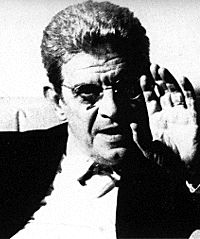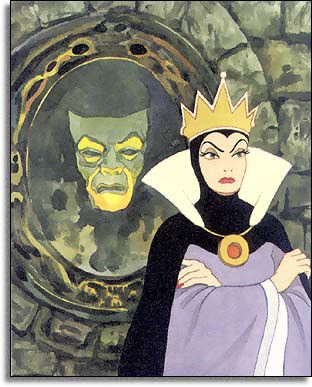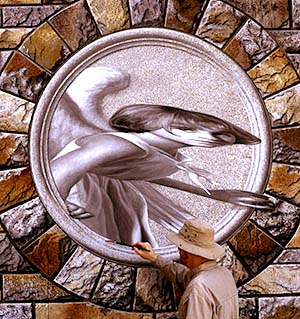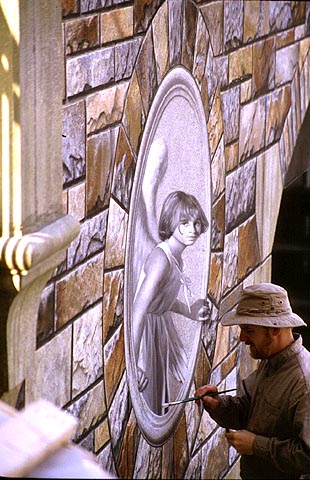Jacques Lacan: "The Mirror Stage as a Formative of the
I Function as Revealed in Psychoanalytic Experience"
OK: nobody's going to call you an intellectual lightweight
if you find this reading difficult, obscure, elusive, or even downright weird.
Try approaching it the way you would a work of fiction or poetry--that is, not
as expository prose the goal of which is to cause you to subscribe to a specific
argument, but, rather, as a kind of thinking that has general goals in mind but
isn't necessarily determined to reach them in linear fashion. That is, if geometry or
trigonometry proofs follow a linear logic--one, that is, in which the various
steps cannot be rearranged without doing irrevocable damage to the argument
itself--here we might be dealing with prose that is attempting to make a point
that can't necessarily be made in "normal" discursive fashion.
fashion. That is, if geometry or
trigonometry proofs follow a linear logic--one, that is, in which the various
steps cannot be rearranged without doing irrevocable damage to the argument
itself--here we might be dealing with prose that is attempting to make a point
that can't necessarily be made in "normal" discursive fashion.
Try thinking of it this way: Freud's investigation of dreams
led to the conclusion that some kinds of thought issue forth in images and ideas
for which our normal, "logical" language is only a poor approximation. Lacan is
asking us to think about some ideas that don't really have a "discursive" or
"logical" existence, but they exist nonetheless. That is, they are outside of
language--or, maybe better, only partially within language. To try to explain
them completely using standard expository prose would be misleading, because it
would leave the non-discursive portions of the idea completely in the dark. So,
Lacan speaks evocatively, elliptically, and uses a great deal of circumlocution,
in order not to name--and hence pin down, maybe damage--his concepts. Don't try
this at home.
Let's start from the very beginning, and try to figure out
what difference there could be, in the title, between simply the personal
pronoun "I" and the "I Function"? That is, why call this most basic and simple
of pronouns an entire function? Before you answer, read on:
You might recall that Descartes experimented with proving
existence with his famous "cogito ergo sum"--I think, therefore I am. In the
very first paragraph of the essay, Lacan distinguishes between the Cartesian use
of the "I" and psychoanalysis' "I function." You might begin by thinking what in
the world the "I function" might be. A function is an action for which someone
or something is employed (the function of a table is to hold things); it is an
assigned duty, a role, or, in math, a variable related to another variable in
such a way that for any value assigned to one variable, there is a determinate
value assigned to the other. Remember your calculus?
Example:
Given f(x) = 3x + 5, find
f(-2)
•With all these definitions of "function" in mind, try to
describe what the "I function" could mean, other than the comparatively simple
fact of simply referring to the person who pronounces the word "I."
 Then we learn that monkeys are smarter than humans, at least for a
little while. But then (p. 3), the human child can recognize an image, and then,
that recognition "gives rise to a series of gestures in which he playfully
experiences the relationship between the movements made in the image and the
reflected environment, and between this virtual complex and the
reality it duplicates--namely, the child's own body, and the
persons and even things around him." Try to understand (a) how this might also
be a function; and (b) the potential meanings and connections in the
italicized words above (not italicized in the original).
Then we learn that monkeys are smarter than humans, at least for a
little while. But then (p. 3), the human child can recognize an image, and then,
that recognition "gives rise to a series of gestures in which he playfully
experiences the relationship between the movements made in the image and the
reflected environment, and between this virtual complex and the
reality it duplicates--namely, the child's own body, and the
persons and even things around him." Try to understand (a) how this might also
be a function; and (b) the potential meanings and connections in the
italicized words above (not italicized in the original).
Lacan wrote his doctoral dissertation on paranoia (and
doesn't that seem appropriate?), so don't worry about the obtuse allusions to
that field. But he refers to the mirror stage--the description of the human
child in front of the mirror--as an identification, and he insists on
understanding that word in its entirety. Specifically, one assumes an
image. •How might the child be assuming an image here, and what are the
ramifications of assuming the image in question? Be specific about what the
image is (read the passage cited above 7 or 8 times) and what the effects of
assuming it are.
The paragraph that begins "The jubilant assumption..." on p.
4 seems especially dense and loaded. Remember, the child in question is between
6 and 18 months old. Perhaps the "jubilant assumption" refers to the
"illuminative mimicry" (the Aha) alluded to on the previous page; infans
means, literally, "without speech." •What sense can you make out of the second
half of the paragraph, in which the "I is precipitated," not yet a function of
identification with the other (I--you)? In other words, how might "I" refer to
something more complex than simply the opposite of "you"?
I asked you to look in the mirror before you began to read
this article, and to hold up your ID, or other photo of yourself, in front of
you so that you could look at both at the same time (don't hold the ID in the
mirro). I wasn't kidding. Do it now. I'll wait...
Remember that Freud said the ego is a bodily ego?
Well, there's a connection to what Lacan is talking about in the mirror stage
here. It's the gestalt. Look the word up if you don't know what it means.
Notice how Lacan emphasizes the child's projection on to his
image of his own future, or, rather, his future power and mastery. Notice how
the image of his body is given to him as a totality, and not a fragment (a hand,
a leg, etc.). Notice also, how the image is constitutive (of what?). But notice,
especially, that the image is exterior to the child, it is frozen,
and it is reversed (4-5). Keeping all this in mind, •how do we understand
the sentence at the top of p. 5 that says "this gestalt is also replete with the
correspondences that unite the I with the statue onto which man projects
himself, the phantoms that dominate him, and the automaton with which the world
of his own making tends to achieve fruition in an ambiguous relation"? To put
the question is oversimplistic terms, what is the power of this alienated,
frozen, and reversed image in creating a bodily ego, and how is it (necessarily)
different from the person assuming it? (This might be counterintuitive, but
think about it.)
Now, keeping your answer to the above question in mind,
think about how it might be the case, as Lacan claims on p. 6, that the function
of the mirror stage ... is to establish a relationship between an organism and
its reality." The image in the mirror (the alienated, frozen, and reversed
image) serves to connect us, each of us who must form such an image, to the
world. We don't access the world directly, mind you--we form a relationship
based on that image to our realities.
Human beings are, Lacan claims, endowed with a specific
prematurity (6). That is, we're especially helpless as very young todlers.
Hence, in the mirror stage, which is a drama, Lacan maintains, the
individual projects its formation into history. It (I'm using that odd pronoun
advisedly here) anticipates its development, forms a totalized image from a body
heretofore perceived only in fragments or bits and pieces. The image provides
the totality that hadn't been there before. •Why does Lacan call this "an
alienating identity that will mark his entire mental development with its rigid
structure" (6)? (Make sure you read through this entire paragraph before
attempting to answer.)
Strikingly, and perhaps reassuringly, the I formation
"is symbolized in dreams by a fortified camp, or even a stadium" (7), which
might lead us to suspect that the fortification is a little defensive. After
all, you build your fortifications at your weakest points, no? When the mirror
stage comes to an end, it sets the subject up in a situation that links the
I to "socially elaborated situations" consisting, in part, of identifying
with the images of "one's semblable." One way to think of this is to think of
the development from a more or less unmediated relatiionship to one's body (one
which nevertheless doesn't give you any totalized picture, just fragments) to
that necessarily and from that time forward mediated by an image, an
image that's largely shared by other people. That's the moment that "decisively
tips the whole of human knowledge into being mediated by the other's desire..."
(7).
•This one's hard, but, alas! necessary: everyone goes
through the same thing, right? So the "other" Lacan is talking about isn't my
sister or my friend next door, or even my parents. Let's try this: maybe the
"other" isn't really even an other person. Carefully reading the two
paragraphs on p. 7 beginning with "This moment at which the mirror stage comes
to an end..." and ending with "...sexual object choice is dependent upon the
Oedipus complex," speculate on what the I as a function (or, here,
apparatus) might be in relation to this other that isn't
necessarily a person. In short, what might the I be, and what might the
other be? (Keep in mind the function of mediation.)


Perspective
is everything
 fashion. That is, if geometry or
trigonometry proofs follow a linear logic--one, that is, in which the various
steps cannot be rearranged without doing irrevocable damage to the argument
itself--here we might be dealing with prose that is attempting to make a point
that can't necessarily be made in "normal" discursive fashion.
fashion. That is, if geometry or
trigonometry proofs follow a linear logic--one, that is, in which the various
steps cannot be rearranged without doing irrevocable damage to the argument
itself--here we might be dealing with prose that is attempting to make a point
that can't necessarily be made in "normal" discursive fashion. Then we learn that monkeys are smarter than humans, at least for a
little while. But then (p. 3), the human child can recognize an image, and then,
that recognition "gives rise to a series of gestures in which he playfully
experiences the relationship between the movements made in the image and the
reflected environment, and between this virtual complex and the
reality it duplicates--namely, the child's own body, and the
persons and even things around him." Try to understand (a) how this might also
be a function; and (b) the potential meanings and connections in the
italicized words above (not italicized in the original).
Then we learn that monkeys are smarter than humans, at least for a
little while. But then (p. 3), the human child can recognize an image, and then,
that recognition "gives rise to a series of gestures in which he playfully
experiences the relationship between the movements made in the image and the
reflected environment, and between this virtual complex and the
reality it duplicates--namely, the child's own body, and the
persons and even things around him." Try to understand (a) how this might also
be a function; and (b) the potential meanings and connections in the
italicized words above (not italicized in the original).
